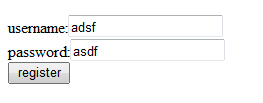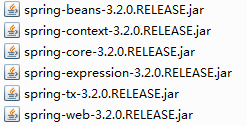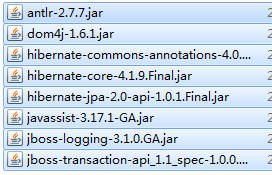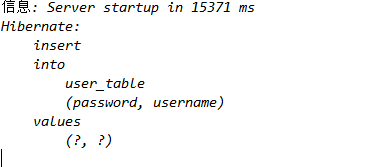刚刚自学了一点ssh的内容,所以简单地把这三个框架整到一起!(这个只是最简单的整合,并不涉及高级的内容)
直接进入主题
一.首先配struts:
1.以下为刚开始要用到的jar包(要加的jar包每个版本好像都有变化,多试试就知道加要哪个包了,下面要加的包都同理):
2.接下来配web.xml:
<?xml version="1.0" encoding="UTF-8"?>
<web-app version="3.0"
xmlns="http://java.sun.com/xml/ns/javaee"
xmlns:xsi="http://www.w3.org/2001/XMLSchema-instance"
xsi:schemaLocation="http://java.sun.com/xml/ns/javaee
http://java.sun.com/xml/ns/javaee/web-app_3_0.xsd">
<display-name></display-name>
<filter>
<filter-name>struts2</filter-name>
<filter-class>org.apache.struts2.dispatcher.ng.filter.StrutsPrepareAndExecuteFilter</filter-class>
</filter>
<filter-mapping>
<filter-name>struts2</filter-name>
<url-pattern>/*</url-pattern>
</filter-mapping>
<welcome-file-list>
<welcome-file>index.jsp</welcome-file>
</welcome-file-list>
</web-app>3.接下来新建index.jsp
<%@ page language="java" import="java.util.*" pageEncoding="UTF-8"%>
<!DOCTYPE HTML PUBLIC "-//W3C//DTD HTML 4.01 Transitional//EN">
<html>
<head>
<title>register page</title>
</head>
<body>
<form action="register.action">
username:<input type="text" name="username"/><br/>
password:<input type="text" name="password"/><br/>
<input type="submit" value="register"/>
</form>
</body>
</html>
4.再新建registerOK.jsp
<%@ page language="java" import="java.util.*" pageEncoding="UTF-8"%>
<!DOCTYPE HTML PUBLIC "-//W3C//DTD HTML 4.01 Transitional//EN">
<html>
<head>
<title>register success</title>
</head>
<body>
congratulation!!!! register success!!!!<br>
<a href="index.jsp">back to the register Page!</a>
</body>
</html>
5.接下来新建action类RegisterAction.java
package com.ice.action;
import com.opensymphony.xwork2.Action;
public class RegisterAction implements Action
{
private long userID;
private String username;
private String password;
public long getUserID()
{
return userID;
}
public void setUserID(long userID)
{
this.userID = userID;
}
public String getUsername()
{
return username;
}
public void setUsername(String username)
{
this.username = username;
}
public String getPassword()
{
return password;
}
public void setPassword(String password)
{
this.password = password;
}
@Override
public String execute() throws Exception
{
System.out.println(getUsername());
System.out.println(getPassword());
return SUCCESS;
}
}6.最后新建struts.xml:
<!DOCTYPE struts PUBLIC
"-//Apache Software Foundation//DTD Struts Configuration 2.0//EN"
"http://struts.apache.org/dtds/struts-2.0.dtd">
<struts>
<package name="register" namespace="/" extends="struts-default">
<action name="register" class="com.ice.action.RegisterAction" >
<result name="success">registerOK.jsp</result>
</action>
</package>
</struts>7.这时struts最简单的就完了。
以下为结果图:
这是控制台的输出:
二.把Spring整合进去(这一部分是使用xml配置的,只是写了,懒得删掉了 ,第三部分是使用Annotation配置的,本部分可以跳过直接进入第三部分)
,第三部分是使用Annotation配置的,本部分可以跳过直接进入第三部分)
1.加入spring的jar包
另外还要加入一个包,在struts的目录下:
2.在web.xml加下spring的支持,以下为修改后的web.xml:
<?xml version="1.0" encoding="UTF-8"?>
<web-app version="3.0" xmlns="http://java.sun.com/xml/ns/javaee"
xmlns:xsi="http://www.w3.org/2001/XMLSchema-instance"
xsi:schemaLocation="http://java.sun.com/xml/ns/javaee
http://java.sun.com/xml/ns/javaee/web-app_3_0.xsd">
<display-name></display-name>
<filter>
<filter-name>struts2</filter-name>
<filter-class>org.apache.struts2.dispatcher.ng.filter.StrutsPrepareAndExecuteFilter</filter-class>
</filter>
<filter-mapping>
<filter-name>struts2</filter-name>
<url-pattern>/*</url-pattern>
</filter-mapping>
<welcome-file-list>
<welcome-file>index.jsp</welcome-file>
</welcome-file-list>
<context-param>
<param-name>contextConfigLocation</param-name>
<param-value>classpath*:applicationContext.xml</param-value>
</context-param>
<listener>
<listener-class>org.springframework.web.context.ContextLoaderListener</listener-class>
</listener>
</web-app>
<?xml version="1.0" encoding="UTF-8"?>
<beans xmlns="http://www.springframework.org/schema/beans"
xmlns:context="http://www.springframework.org/schema/context"
xmlns:xsi="http://www.w3.org/2001/XMLSchema-instance"
xsi:schemaLocation="
http://www.springframework.org/schema/beans
http://www.springframework.org/schema/beans/spring-beans.xsd
http://www.springframework.org/schema/context
http://www.springframework.org/schema/context/spring-context.xsd">
<bean id="reigsterAction"
class="com.ice.action.RegisterAction">
</bean>
</beans>
<!DOCTYPE struts PUBLIC
"-//Apache Software Foundation//DTD Struts Configuration 2.0//EN"
"http://struts.apache.org/dtds/struts-2.0.dtd">
<struts>
<package name="register" namespace="/" extends="struts-default">
<action name="register" class="reigsterAction" >
<result name="success">registerOK.jsp</result>
</action>
</package>
</struts>
5.结果就不上图了,因为跟前面一样,这一步只是把Actioin交给spring而己
三.把struts整合进spring(想一想spring好像用Annotation比较方便,那就改成Annotation吧!(那第二部分可以略过

 ))
))
1.加入spring的jar包
另外还要加入一个包,在struts的目录下:
2.在web.xml加下spring的支持,以下为修改后的web.xml:
<?xml version="1.0" encoding="UTF-8"?>
<web-app version="3.0" xmlns="http://java.sun.com/xml/ns/javaee"
xmlns:xsi="http://www.w3.org/2001/XMLSchema-instance"
xsi:schemaLocation="http://java.sun.com/xml/ns/javaee
http://java.sun.com/xml/ns/javaee/web-app_3_0.xsd">
<display-name></display-name>
<filter>
<filter-name>struts2</filter-name>
<filter-class>org.apache.struts2.dispatcher.ng.filter.StrutsPrepareAndExecuteFilter</filter-class>
</filter>
<filter-mapping>
<filter-name>struts2</filter-name>
<url-pattern>/*</url-pattern>
</filter-mapping>
<welcome-file-list>
<welcome-file>index.jsp</welcome-file>
</welcome-file-list>
<context-param>
<param-name>contextConfigLocation</param-name>
<param-value>classpath*:applicationContext.xml</param-value>
</context-param>
<listener>
<listener-class>org.springframework.web.context.ContextLoaderListener</listener-class>
</listener>
</web-app>3.在src目录下新建一个applicationContext.xml:
<?xml version="1.0" encoding="UTF-8"?>
<beans xmlns="http://www.springframework.org/schema/beans"
xmlns:context="http://www.springframework.org/schema/context"
xmlns:xsi="http://www.w3.org/2001/XMLSchema-instance"
xsi:schemaLocation="
http://www.springframework.org/schema/beans
http://www.springframework.org/schema/beans/spring-beans.xsd
http://www.springframework.org/schema/context
http://www.springframework.org/schema/context/spring-context.xsd">
<!-- 添加对Annotation的支持 -->
<context:annotation-config />
<!-- 扫描该包下的所有Bean(@Component) -->
<context:component-scan base-package="com.ice" />
</beans>4.个改struts.xml:
<!DOCTYPE struts PUBLIC
"-//Apache Software Foundation//DTD Struts Configuration 2.0//EN"
"http://struts.apache.org/dtds/struts-2.0.dtd">
<struts>
<package name="register" namespace="/" extends="struts-default">
<action name="register" class="registerAction" >
<result name="success">registerOK.jsp</result>
</action>
</package>
</struts>
5.修改一下Aaction:
package com.ice.action;
import org.springframework.context.annotation.Scope;
import org.springframework.stereotype.Controller;
import com.opensymphony.xwork2.Action;
@Controller(value="reigsterAction")
@Scope(value="prototype")
public class RegisterAction implements Action
{
private long userID;
private String username;
private String password;
public long getUserID()
{
return userID;
}
public void setUserID(long userID)
{
this.userID = userID;
}
public String getUsername()
{
return username;
}
public void setUsername(String username)
{
this.username = username;
}
public String getPassword()
{
return password;
}
public void setPassword(String password)
{
this.password = password;
}
@Override
public String execute() throws Exception
{
System.out.println(getUsername());
System.out.println(getPassword());
return SUCCESS;
}
}5.结果就不上图了,因为跟前面一样,这一步只是把Actioin交给spring而己
四.把hibernate整进去;
1.还是先加包:
hibernate下的必需包(required):
还 需要dbcp的这两个包:
除此之外还需要再加这个包(在spring的目录下):
2.建立与数据库对映的model:
package com.ice.model;
import javax.persistence.Entity;
import javax.persistence.GeneratedValue;
import javax.persistence.GenerationType;
import javax.persistence.Id;
import javax.persistence.Table;
@Entity
@Table(name="user_table")
public class UserModel
{
private long userID;
private String username;
private String password;
@Id
@GeneratedValue(strategy= GenerationType.AUTO)
public long getUserID()
{
return userID;
}
public void setUserID(long userID)
{
this.userID = userID;
}
public String getUsername()
{
return username;
}
public void setUsername(String username)
{
this.username = username;
}
public String getPassword()
{
return password;
}
public void setPassword(String password)
{
this.password = password;
}
}
3.建立DAO层:
package com.ice.dao;
import com.ice.model.UserModel;
public interface UserDAO
{
public void save(UserModel userModel);
}package com.ice.dao.impl;
import javax.annotation.Resource;
import org.hibernate.Session;
import org.hibernate.SessionFactory;
import org.hibernate.Transaction;
import org.springframework.stereotype.Repository;
import com.ice.dao.UserDAO;
import com.ice.model.UserModel;
@Repository
public class UserDAOImpl implements UserDAO
{
private SessionFactory sessionFactory;
public SessionFactory getSessionFactory()
{
return sessionFactory;
}
@Resource(name="mySessionFactory")
public void setSessionFactory(SessionFactory sessionFactory)
{
this.sessionFactory = sessionFactory;
}
@Override
public void save(UserModel userModel)
{
Session session = sessionFactory.getCurrentSession();
Transaction tx = session.getTransaction();
try{
tx.begin();
session.save(userModel);
tx.commit();
}catch (Exception e) {
tx.rollback();
e.printStackTrace();
}
}
}
4.建立Service层:
package com.ice.service;
import com.ice.model.UserModel;
public interface UserService
{
public void save(UserModel userModel);
}package com.ice.service.impl;
import javax.annotation.Resource;
import org.springframework.stereotype.Repository;
import org.springframework.stereotype.Service;
import com.ice.dao.UserDAO;
import com.ice.model.UserModel;
import com.ice.service.UserService;
@Service
public class UserServiceImpl implements UserService
{
private UserService loginService;
private UserDAO loginDAO;
public UserService getLoginService()
{
return loginService;
}
public void setLoginService(UserService loginService)
{
this.loginService = loginService;
}
public UserDAO getLoginDAO()
{
return loginDAO;
}
@Resource(name="userDAOImpl")
public void setLoginDAO(UserDAO loginDAO)
{
this.loginDAO = loginDAO;
}
@Override
public void save(UserModel userModel)
{
loginDAO.save(userModel);
}
}5.修改Action:
package com.ice.action;
import javax.annotation.Resource;
import org.springframework.context.annotation.Scope;
import org.springframework.stereotype.Controller;
import com.ice.model.UserModel;
import com.ice.service.UserService;
import com.opensymphony.xwork2.Action;
@Controller(value="registerAction")
@Scope(value="prototype")
public class RegisterAction implements Action
{
private long userID;
private String username;
private String password;
private UserService loginService;
public long getUserID()
{
return userID;
}
public void setUserID(long userID)
{
this.userID = userID;
}
public String getUsername()
{
return username;
}
public void setUsername(String username)
{
this.username = username;
}
public String getPassword()
{
return password;
}
public void setPassword(String password)
{
this.password = password;
}
public UserService getLoginService()
{
return loginService;
}
@Resource(name="userServiceImpl")
public void setLoginService(UserService loginService)
{
this.loginService = loginService;
}
@Override
public String execute() throws Exception
{
UserModel userModel = new UserModel();
userModel.setUserID(userID);
userModel.setUsername(username);
userModel.setPassword(password);
loginService.save(userModel);
return SUCCESS;
}
}6.把hibernate交给spring:
<?xml version="1.0" encoding="UTF-8"?>
<beans xmlns="http://www.springframework.org/schema/beans"
xmlns:context="http://www.springframework.org/schema/context"
xmlns:xsi="http://www.w3.org/2001/XMLSchema-instance"
xsi:schemaLocation="
http://www.springframework.org/schema/beans
http://www.springframework.org/schema/beans/spring-beans.xsd
http://www.springframework.org/schema/context
http://www.springframework.org/schema/context/spring-context.xsd">
<!-- 添加对Annotation的支持 -->
<context:annotation-config />
<!-- 扫描该包下的所有Bean(@Component) -->
<context:component-scan base-package="com.ice" />
<bean id="myDataSource" class="org.apache.commons.dbcp.BasicDataSource"
destroy-method="close">
<property name="driverClassName" value="com.mysql.jdbc.Driver" />
<property name="url" value="jdbc:mysql://localhost:3306/ssh" />
<property name="username" value="root" />
<property name="password" value="" />
</bean>
<bean id="mySessionFactory"
class="org.springframework.orm.hibernate4.LocalSessionFactoryBean">
<property name="dataSource" ref="myDataSource" />
<property name="packagesToScan">
<list>
<value>com.ice.model</value>
</list>
</property>
<property name="hibernateProperties">
<props>
<prop key="hibernate.dialect">org.hibernate.dialect.MySQLDialect</prop>
<prop key="hibernate.current_session_context_class">org.springframework.orm.hibernate4.SpringSessionContext</prop>
<prop key="hibernate.current_session_context_class">thread</prop>
<prop key="hibernate.show_sql">true</prop>
<prop key="hibernate.format_sql">true</prop>
<prop key="hibernate.hbm2ddl.auto">update</prop>
</props>
</property>
</bean>
</beans>7.在数据库中新建一个数据库:
create database ssh;8.运行,成功!结果最后结果:
五.这是我第一次技术博客,大家多多指教!
这是项目的源文件:http://download.csdn.net/detail/yingbingxue/5356867
































 184
184











 被折叠的 条评论
为什么被折叠?
被折叠的 条评论
为什么被折叠?








